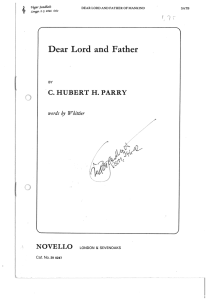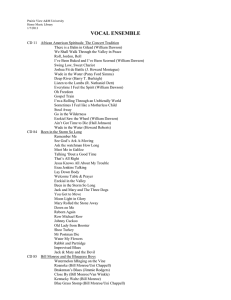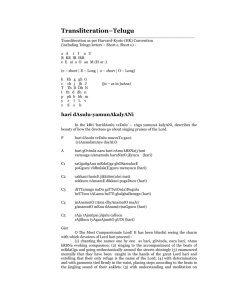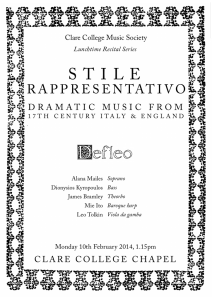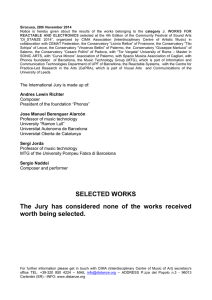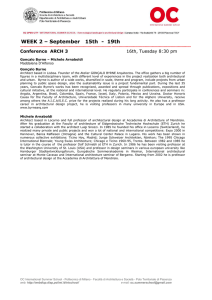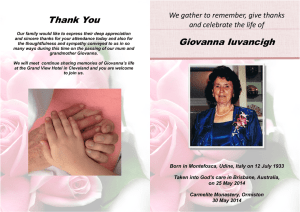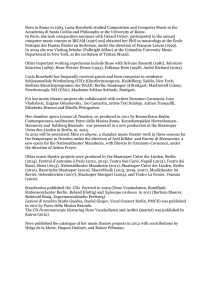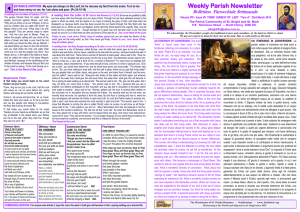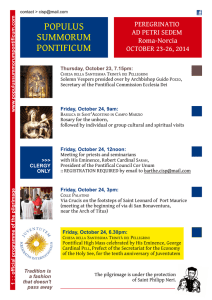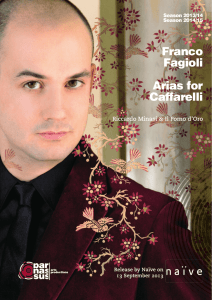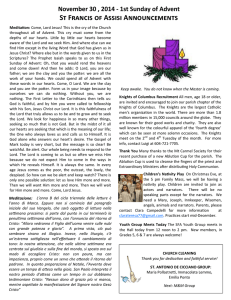Programme - Early Music Society of the Islands
advertisement
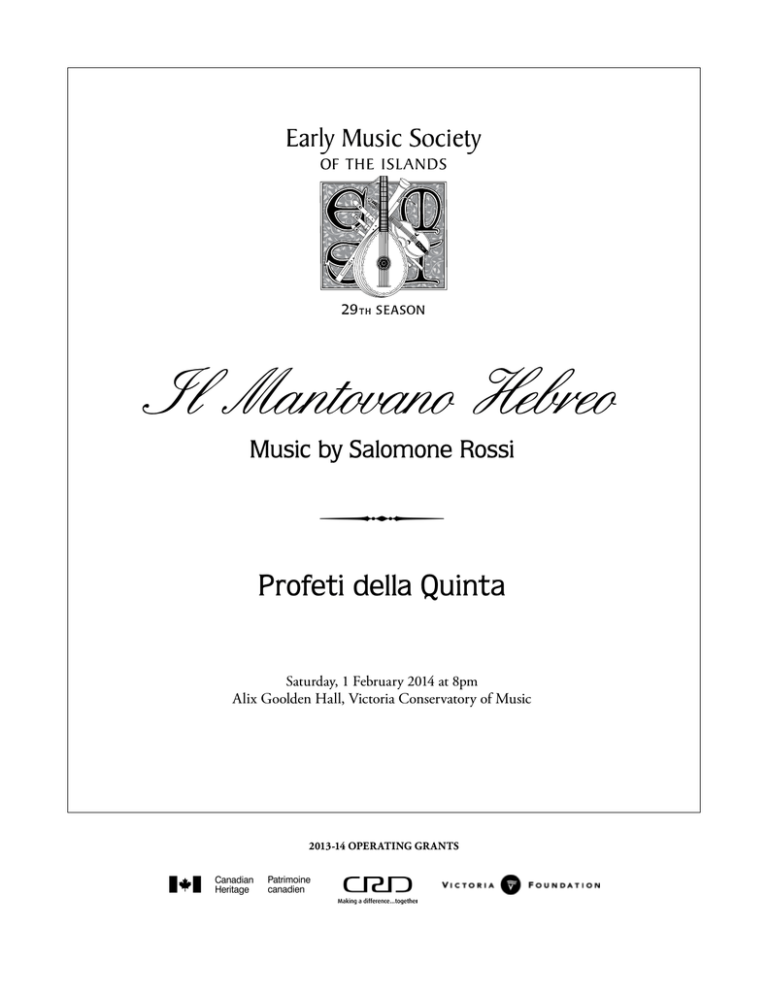
29 T H SEASON Il Mantovano Hebreo Music by Salomone Rossi S Profeti della Quinta Saturday, 1 February 2014 at 8pm Alix Goolden Hall, Victoria Conservatory of Music 2013‑14 OPERATING GRANTS 2013–14 Concert Season Saturday, 22 February 2014 Alix Goolden Hall 8pm S Saturday, 12 April 2014 Alix Goolden Hall 8pm Jeffrey Cohan baroque flute Hans-Jürgen Schnoor harpsichord (Germany) Simphonie Nouvelle (Seattle) Harry Van der Kamp bass (Netherlands) Portland Baroque Orchestra Monica Huggett violin and direction (UK) Emanuel Bach Tricentennial Seventeenth-century German cantatas 2014 marks the 300th anniversary of the birth of C.P.E. Bach. EMSI celebrates by hosting one of the world’s great keyboardists and some of Seattle’s most distinguished early music specialists in performances of flute and harpsichord concerti by Emanuel Bach, and the Suite in B minor by his father, Johann Sebastian. EMSI is proud to present the Victoria debut of Harry Van der Kamp, the legendary Dutch bass with more than 120 CDs to his credit. The equally distinguished Monica Huggett leads performances of cantatas and instrumental music by Johann Christoph Bach, Bruhns, Rosemüller, Tunder and Biber. SPE CI A L E V E N T Co-presented with Pacific Opera Victoria Friday, 14 March and Saturday, 15 March 2014 McPherson Playhouse 8pm Boston Early Music Festival Ensemble, Boston Early Music Festival Dance Ensemble (USA) Paul O’Dette and Stephen Stubbs, Musical Directors Marc-Antoine Charpentier La Descente d’Orphée aux Enfers and La Couronne de Fleurs First played for the Dauphin of France in 1686 For the first time ever, Victoria audiences will have the opportunity to experience a staged baroque opera, performed in a period style by one of the world’s leading baroque music ensembles. Close to thirty singers, dancers and musicians will perform a double bill of operas by Marc-Antoine Charpentier, first played for the Dauphin of France. This is the most ambitious production in EMSI’s almost thirty-year history. S E MSI SEASON SPONSORS Il Mantovano Hebreo Music by Salomone Rossi c.1570–c.1630 Profeti della Quinta Doron Schleifer, David Feldman, cantus Lior Leibovici, Dan Dunkelblum, tenor Elam Rotem, bass, harpsichord, musical direction Ori Harmelin, chitarrone S Shir hama’alot, ashrei kol yeré ‘adonái – Psalm 128 Elohim hashivénu – Psalm 80:4, 8, 20 Shir hama’alót, beshúv ‘adonái – Psalm 126 Sfogava con le stelle Tu parti, ahi lasso Cor mio, deh non languire Udite, lacrimosi spirti d’averno Passacaglia (A. Piccinini 1566–ca.1638) Tirsi mio, caro Tirsi Rimanti in pace; 2a parte: Ond’ei di morte Mizmór letodá – Psalm 100 Haleluyáh, Halelì nafshì ‘et ‘adonái – Psalm 146 ‘Al naharót bavél – Psalm 137 Hinah yafa ra’yati – Hohelied 4:1-7 (E.Rotem) Ohimè, se tanto amate Shchora ani ve’nava – Hohelied 1:5-7 (E.Rotem) Messaggier di speranza Vedro’l mio sol In dolci lacci Yitgadál veyitkadásh – Full Kaddish S Programme Notes S The programme portrays Salomone Rossi’s manyfaceted talents as a court composer in the service of the Gonzaga family and as a unique innovator of devotional Hebrew music. Although overshadowed by the works of his colleague and collaborator Claudio Monteverdi, Rossi’s madrigals are beautiful and refined examples of the genre. They also feature an important milestone in music history: Rossi’s Primo libro di Madrigali á 5 (1600) includes the first known printed intabulation for the chitarrone, also known as the theorbo. This novelty creates a bridge between the sixteenth-century polyphonic madrigal and the new musical style of the early seventeenth century. Alongside his prolific secular activities, Rossi, being Jewish, tried to revolutionize the music in the Synagogue by introducing polyphonic settings of Hebrew prayers and psalms. These Hebrew pieces are characterized by their elegant simplicity, yet at times Rossi calls upon madrigalistic elements in order to heighten the emotions in the listeners’ hearts. “Song of ascents” is a title given to fifteen of the Psalms, each of which starts with the Hebrew ascription ( תולעמה רישShir hama’alót). They are also referred to as “gradual psalms”, “songs of steps” or “pilgrim songs”. Many scholars believe these psalms were sung by worshippers as they ascended the road to Jerusalem to attend pilgrim festivals or by priests as they ascended the fifteen steps to minister at the temple in Jerusalem. They are well suited to being sung because of their poetic form and the sentiments they express. Characterized by brevity, by a keyword or by repetition, more than half of them are cheerful and all of them are hopeful. My • Free, no-fee public education motion to record names • Small neighbourhood schools for Board All good New Year voteswishes carried for the • Put the brakes on niche schools ~ With appreciation for EMSI’s February 2012, ensuring outstanding presence•inPublic Victoria’s culture talk-back at board meetings increased accountability • No wireless in elementary schools 4 The Artists S Focusing on repertoire from the sixteenth and early seventeenth centuries, the vocal ensemble Profeti della Quinta aims to create vivid and expressive performances for today’s audiences. In particular, this is achieved through addressing the performance practices of the time. From its core of five male singers, the ensemble collaborates with instrumentalists and additional singers where required. Profeti della Quinta has been active in researching and performing hitherto neglected repertoire, such as Emilio de’ Cavalieri’s Lamentations (1600) and Salomone Rossi’s Hashirim asher li’Shlomo (1623), the first publication of polyphony in Hebrew, which they recorded on PAN Classics and Linn records to critical acclaim. The ensemble performs regularly in w music festivals and venues around the world, such as the Oude Muziek Festival in Utrecht (the Netherlands) and the York Early Music Festival (UK). Profeti della Quinta took part in a documentary about Salomone Rossi, filmed in Mantua. In July 2011 the ensemble won the York Early Music young artists competition. Highlights of the 2014 season include concerts in Canada, the United States, Japan, Germany, Austria and France. The Ensemble was founded in the Galilee region of Israel by the bass and harpsichordist Elam Rotem. It is currently based in Switzerland, where all its members undertook further study at the Schola Cantorum Basiliensis. The members of the ensemble have benefited both individually and collectively from the expertise of leading musicians in the field of early music. Winchester Galleries 758 humboldt st. (beside the 250-386-2773 Marriott hotel) 796 humboldt st. (at Blanshard) 250-382-7750 winchestergalleriesltd.com 5 2260 Oak Bay avenue 250-595-2777 Texts and Translations Shir hama’alót ‘ashréi kol yeré ‘adonái Psalm 128 Shir hama’alót, ‘Ashréi kol yeré ‘adonái haholékh bidrakháv. Yegía’ kappékha ki tokhél; ‘ashrékha vetóv lakh. ‘Eshtekhá kegéfen poriyyá beyarketéi veitékha; banékha kishtiléi zeitím savív leshulh.anékha. Hinné khi khen yevórakh gáver yeré ‘adonái. Yevarekhekhá ‘adonái mitsiyyón, ur’é betúv yerushaláyim kol yeméi h.ayékha. Ur’é vanìm levanékha; shalóm ‘al yisra’él. A song of ascents. Blessed are all who fear the Lord, who walk in obedience to him. You will eat the fruit of your labor; Blessings and prosperity will be yours. Your wife will be like a fruitful vine within your house; Your children will be like olive shoots around your table. This will be the blessing for the man who fears the Lord. May the Lord bless you from Zion; May you see the prosperity of Jerusalem all the days of your life. May you live to see your children’s children; peace be on Israel. S Elohim hashivénu Psalm 80:4, 8, 20 Elohim hashivénu veha’ér panékha venivashé’a. Elohim tseva’ót hashivenu veha’ér panékha venivashé’a. Adonái ‘elohim tseva’ót hashivenu veha’ér panékha venivashé’a. God restore us, brighten Your face and we shall be saved. God of hosts restore us, brighten Your face and we shall be saved. Lord God of hosts restore us, brighten Your face and we shall be saved. Shir hama’alót, Beshúv ‘adonái Psalm 126 Shir hama’alót, Beshúv ‘adonái ‘et shivát tsiyyón, hayínu kecholemím. ‘Az yimmalé sechók pínu ulshonénu rinná. ‘az yomerú vaggoyím: higdíl ‘adonái la’asót ‘im ‘élle. Higdíl ‘adonái la’asót ‘immánu, hayínu semechím. Shuvá ‘adonái ‘et sheviténu ka’afikím bannégev. Hazzore’ím bedim’á berinná yiktsóru. Halókh yelékh uvakhó nose meshekh hazzára’. Bo yavó verinná nose ‘alumotáv. Then it was said among the nations: “The Lord has done great things for them.” The Lord has done great things for us, and we are filled with joy. Restore our fortunes, Lord, like streams in the Negev. Those who sow with tears will reap with songs of joy. Those who go out weeping, carrying seed to sow, will return with songs of joy, carrying sheaves with them. Sfogava con le stelle prob. Ottavio Rinuccini (1562-1621) Sfogava con le stelle Un infermo d’amore, Sotto notturno ciel, il suo dolore; E dicea, fisso in loro: “O imagini belle De l’idol mio ch’adoro, Sì come a me mostrate, Mentre così splendete, La sua rara beltate, Così mostraste a lei, Mentre cotanto ardete, I vivi ardori miei; La fareste col vostro aureo sembiante Pietosa sì, com’hor me fate amante.” A lovesick man poured forth To the stars In the nighttime sky, his grief, And said, his eyes fixed on them: “Oh beautiful images A song of ascents. Of my idol, whom I adore, When the Lord restored the Just as you show me, fortunes of Zion, While you so glitter, we were like those who dreamed. Our mouths were filled with laughter, Her rare beauty, So may you show her, our tongues with songs of joy. 6 While you so strongly burn, My living fires; With your golden features, you might make her Merciful, just as you now make me amorous.” Tu parti, ahi lasso Giambattista Marino (1569-1625) Tu parti, ahi lasso, e il core Mi parte il tuo partire; E fra il dubbio e il martire, Mentre ch’io tremo e piango, Muto amante rimango. Ma se tremando agghiaccio Miseramente e taccio, Parla il silentio e fann’ufficio intanto Gl’occhi di bocca e di parole il pianto. You are parting, alas, And your parting parts my heart; And among doubts and torments, While I tremble and weep, I remain a speechless lover. But though in trembling I freeze Miserably, and stay silent, The silence speaks, and meantime The eyes act for the mouth, and the tears for the words. Cor mio, deh, non languire Giovanni Battista Guarini (1538-1612) Cor mio, deh, non languire, Che fai teco languir l’anima mia. Odi i caldi sospiri: a te gl’invia La pietate e’l desire. S’io ti potessi dar morend’aita, Morrei per darti vita. Ma vive, ohimè, ch’ingiustamente more Chi vivo tien ne l’altrui petto il core. My heart, oh, do not languish, For you make my soul languish with you. Hear my hot sighs: they are sent to you By pity and desire. If I could give you help by dying, I would die to give you life. But, alas, lives the one, who unjustly dies For keeping his heart alive in another’s breast. Coming up at the 2014 Vancouver Early Music Festival: G.F. Handel: “Il Trionfo del Tempo” (The Triumph of Time) Alexander Weimann Amanda Forsythe All-star soloists include Amanda Forsythe, Krisztina Szabó, Reginald L. Mobley & Colin Balzer Krisztina Szabó Pleasure & Beauty abound in Handel’s first oratorio Alexander Weimann music director Pacific Baroque Orchestra Reginald L. Mobley Thursday, August 7, 2014 at 7:30pm Chan Centre for the Performing Arts at UBC Tickets available through Ticketmaster beginning February 15. Colin Balzer Information: www.earlymusic.bc.ca Tickets: www.ticketmaster.ca 7 Colin Balzer Udite, lacrimosi Spirti d’Averno Guarini (from Il Pastor fido, III 6) Tirsi mio, caro Tirsi Guarini Rimanti in pace Livio Celiano (1557-1629) Udite, lacrimosi Spirti d’Averno, udite Nova sorte di pene e di tormento. Mirate crudo affetto In sembiante pietoso: La mia donna crudel più de l’inferno. Perchè una sola morte Non può far satia la sua ingorda voglia. E la mia vita è quasi Una perpetua morte: Mi comanda ch’io viva, Perchè la vita mia Di mille mort’il dì ricetto sia. Tirsi mio, caro Tirsi, E tu ancor m’abbandoni? Così morir mi lasci e non m’aiti? Almen non mi negar gl’ultimi baci. Ferrirà pur due petti un ferro solo; Verserà pur la piaga Di tua Filli il tuo sangue. Tirsi, un tempo sì dolce e caro nome, Ch’invocar non soleva indarno mai, Soccorri a me, tua Filli, Chè, come vedi, da spietata sorte Condotta son a cruda et empia morte. Hear, watery Spirits of Avernus, hear A new fate of pain and of suffering. Behold a cruel affection In a merciful face: ‘Tis my lady, more cruel than Hell. For a single death Cannot satisfy her gluttonous desire. And My life resembles A perpetual death: She commands me to live, In order for my life To be a harbour for a thousand deaths per day. My Tirsi, dear Tirsi, Are you deserting me again? Thus you leave me to my death without helping me? Do not refuse me, at least, the last kisses. One sword alone will indeed wound two hearts; The wound of your Filli Will indeed shed your blood. Tirsi, once a name so sweet and dear, That I used never to appeal to in vain, Assist me, your Filli, For as you see, by ruthless fate I am led to a cruel and wicked death “Rimanti in pace,” alla dolente e bella Fillida, Tirsi, sospirando, disse: “Rimanti; io me ne vò, tal mi prescrisse Legge, empio fato e sorte aspra e rubella.” Ed ella, hora da l’una e l’altra stella Stillando amaro umore, i lumi affisse Nei lumi del suo Tirsi, e gli traffisse Il cor di pietosissime quadrella. Ond’ei, di morte la sua faccia impressa, Disse: “ahi, come n’andrò senza il mio Sole Di martir in martir, di doglie in doglie?” Ed ella, da singhiozzi e pianti oppressa, Fievolmente formò queste parole: “Deh, cara anima mia, chi mi vi toglie?” James R. Craven and Associates 5721 Titan Place, Sooke, BC V9Z 1B4 “Stay in peace,” said Tirsi, sighing, To the sorrowing and beautiful Fillida. “Stay; I must go, thus I’ve been ordered by law, by wicked destiny, by a harsh and stubborn fate.” And she, distilling a bitter liquid now from the one, Now from the other star, fixed her beams • executive searches • salary studies • consulting • workshops Tel 250.744.9455 8 craven@telus.net www.jrcraven.ca On the beams of her Tirsi, and pierced His heart with most merciful darts. At that point he, with death stamped on his face, Said: “alas! without my sun, how will I survive, Going from pain to pain, from sorrow to sorrow?” And she, oppressed with sighs and tears, Feverishly formed these words: “Oh my dear soul, who takes you away from me?” Mizmór letodá Psalm 100 Mizmór letodá. Harí’u ladonái, kol ha’árets. ‘Ivdú ‘et ‘adonái besimchá, bó’u lefanáv birnaná. De’ú ki ‘adonái hu ‘elohím, hu ‘asánu veló ‘anáchnu, ‘ammó vetsón mar’itó. Bó’u she’aráv betodá, chatsetotáv bithillá, hodu lo, barekhú shemó. Ki tov ‘adonái, le’olám chasdó ve’ad dor vadór ‘emunató. A psalm for giving grateful praise. Shout for joy to the Lord, all the earth. Worship the Lord with gladness; come before him with joyful songs. Know that the Lord is God. It is he who made us, and we are his; we are his people, the sheep of his pasture. Enter his gates with thanksgiving, and his courts with praise; give thanks to him and praise his name. For the Lord is good and his love endures forever; his faithfulness continues through all generations. Haleluyáh, Halelì nafshì ‘et ‘adonái Psalm 146 Haleluyáh: Halelì nafshì ‘et ‘adonái. ‘Ahalelá ‘adonái beh.ayyái; ‘azammerá lelohái be’odì. ‘Al tivteh.ú vindivim, beven ‘adám she ‘éin lo teshu’á. Tetsé ruh.ó, yashúv le’admató; Bayyóm hahú ‘avedú e’shtonotáv. ‘Ashréi she’él ya’akóv be’ezró; Sivró ‘al ‘adonái ‘eloháv. ‘Osé shamáyim va’árets, ‘et hayyám ve’et kol ‘asher bam; Hashomér ‘emét le’olám. ‘Osé mishpát la’ashukìm, notén léh. em lare’evìm; ‘adonái mattir ‘asurìm. ‘Adonái pokéah. ‘ivrim, ‘adonái zokéf kefufum; ‘adonái ‘ohév tsaddikìm. ‘Adonái shomér ‘et gerìm, 9 yatóm ve’almaná ye’odéd vedérekh resha’ìm ye’avvét. Yimlokh ‘adonái le’olám, ‘eloháyikh tsiyyón ledór vadór: Haleluyáh. Praise the Lord. Praise the Lord, my soul. I will praise the Lord all my life; I will sing praise to my God as long as I live. Do not put your trust in princes, in human beings, who cannot save. When their spirit departs, they return to the ground; on that very day their plans come to nothing. Blessed are those whose help is the God of Jacob, whose hope is in the Lord their God. He is the Maker of heaven and earth, the sea, and everything in them, he remains faithful forever. The Lord upholds the cause of the oppressed. The Lord gives food to the hungry. The Lord sets prisoners free. The Lord gives sight to the blind, The Lord lifts up those who are bowed down, The Lord loves the righteous. The Lord watches over the foreigner and sustains the fatherless and the widow.] He frustrates the ways of the wicked. The Lord reigns forever, your God, O Zion, for all generations. Praise the Lord. ‘Al naharót bavél Psalm 137 ‘Al naharót bavél sham yashávnu gam bakhinu bezokhrénu et tsiyon. ‘Al ‘aravím betokháh talínu kinorotéinu. Ki sham she’elúnu shovéinu divrei shir vetolaléinu simh.á shíru lánu mishír tsiyón. Eikh nashír et shir adonái ‘al admát nekhár. Im eshkah.ékh yerushaláyim tishkáh. yeminí. Tidbák leshoní leh.ikí im lo ezkerékhi im lo a’alé et yerushaláyim ‘al rosh simh.ati. Zekhór adonái livnéi edóm et yom yerushaláyim ha’omerim ‘áru ‘áru ‘ad hayesód bah. Bat bavél hashedudá ashréi sheyeshalém lakh et gemulékh shegamált lánu. Ashréi sheyoh.éz venipéts et ‘olaláyikh el hasála’. By the rivers of Babylon, there we sat down; yea, we wept when we remembered Zion. On willows in its midst we hung our lyres. For there were we asked by our captors to deliver songs and by our oppressors to make merry, sing us a song of Zion. How can we sing the song of the Lord in a foreign land? If I forget you Jerusalem let my right hand forget itself. Let my tongue stick to my palate if I do not remember you, if I do not raise Jerusalem to the summit of my joy. Remember Lord the sons of Edom in the day of Jerusalem. They said: raze it, raze it to its foundations. Daughter of Babylon to be ravaged, blessed be he who repays you in the coin you paid us. Blessed be he who grasps and smashes your babes against the rocks. Hinach yafa ra’yati Hohelied 4:1-7 Hinach yafa ra’yati, hinach yafa. Einayich yonim miba’ad letsamatech, se’arech ke’eder ha’izim shegalshu mehar Gil’ad. Shinayich ke’eder haktsuvut she’alu min harachatsa, shekulam mat’imot veshakula ein bahem. Kechut hashani siftotaich umidbarech nave, 10 kefelach harimon rakatech miba’ad letsamatech. Kemigdal David tsavarech banui letalpiot, elef hamagen talui alav, kol shiltei hagiborim. Shnei shadayich kishnei ofarim te’omei tsvia haro’im bashoshanim. Ad sheyafuach hayom venasu hatslalim, elech li el har hamor ve’el giv’at ha levona. Kulech yafa rayati vemum ein bach. Behold, thou art fair, my love; behold, thou art fair. Thou hast doves’ eyes within thy locks; thy hair is as a flock of goats that appear from Mount Gilead. Thy teeth are like a flock of sheep that are even shorn which came up from the washing, whereof every one bear twins, and none is barren among them. Thy lips are like a thread of scarlet, and thy speech is comely; thy temples are like a piece of a pomegranate within thy locks. Thy neck is like the tower of David builded for an armory, whereon there hang a thousand bucklers, all shields of mighty men. Thy two breasts are like two young roes that are twins, which feed among the lilies. Until the day break and the shadows flee away, I will get me to the mountain of myrrh and to the hill of frankincense. Thou art all fair, my love; there is no spot in thee. Ohimè, se tanto amate Guarini Ohimè, se tanto amate Di sentir di “ohimè,” deh perchè fate Chi dice “ohimè” morire? S’io moro, un sol potrete Languido e doloroso “ohimè” sentire; Ma se cor mio vorrete Che vita habbia da voi e voi da me, Havrete mille e mille dolci “ohimè”. Alas, if you love so much To hear me say “alas!”, then why do you make Him who says “alas!” die? If I die, you’ ll only hear A single languid and sorrowful “alas”; But if you want, my heart, For me to have life from you and you from me, You will have sweet “alas” by the thousands. Messaggier di speranza Gabriello Chiabrera (1552-1638) Shchora ani ve’nava Hohelied 1:5-7 Shchora ani ve’nava bnot Yerushalaim, ke’ohalei Kedar, Kiri’ot Shlomo. Al Tir’uni shani shcharchoret She’shzafatni hashamesh. Bnei imi nicharu vi, samuni notera et hakramim, karmi sheli lo natarti. Hagida li she’ahava nafshi, eicha tir’e? eicha tarbits batsaharayim? Shalama ehye ke’otya al edrei chaverecha? Dark am I, yet lovely, daughters of Jerusalem, dark like the tents of Kedar, like the tent curtains of Solomon. Look not upon me because I am black, because the sun hath looked upon me. My mother’s children were angry with me; they made me the keeper of the vineyards, but mine own vineyard have I not kept. Tell me, O thou whom my soul loveth, where thou feedest, where thou makest thy flock to rest at noon; for why should I be as one that turneth aside by the flocks of thy companions?” Make Our House Your Home 1961 Fairfield Road Victoria, BC V8S 1H5 (250) 598–3542 Messaggier di speranza, Amato sì degl’occhi miei conforto, Lume di due pupille, ove m’hai scorto? Di quanti miei tormenti Oggi fassi cagion il tuo splendore? E de tuoi raggi ardenti, Quanto, oh quanto, potria dolersi il core? Ma sì mi vince amore, Ch’omai sommerso fra tempeste e morto, Amo non men che s’io mi fossi in porto. Messenger of hope, So beloved a comfort for my eyes, Beam of two pupils, where have you led me to? How many of my torments Today, are due to your splendor? How much, oh how much could my heart Suffer from your burning rays? But love so conquers me, That though submerged midst storms, and dead, I love no less than if I were in a port. Youth Tickets for EMSI Concerts Bring-a-Teen-for-Free Each adult/senior ticket-holder may bring one teen free of charge Tickets available at the door for Main Series concerts only, unless concert is sold out Student Rush Tickets Tickets at the door, with student card Main Series $8, Special concerts $10 harthouse@shaw.ca • www.harthousevictoria.com 11 Vedrò’l mio sol Guarini In dolci lacci Anonymous Vedrò’l mio sol, vedrò prima ch’io mora, Quel sospirato giorno, Che faccia il vostro raggio à me ritorno. O mia luce, o mia gioia, Ben più me è dolce il tormentar per vui, che il gioir per altrui. Ma senza morte io non potrò soffrire, Un sì lungo martire; E s’io morrò, morrà mia speme ancora, Di veder mai d’un sì bel dì l’aurora. In dolci lacci e’in un soave foco Mi sfaccio a poco a poco, E tanta gioia sento Fra le pene e il tormento, Ch’io canto a tutte l’hore: Viva, viva Amore che m’ardi il core! I will see my sun, will see it before I die, On that sighing day, That would make your ray return to me. Oh my light, oh my joy, To torment for you is sweeter Than to be happy for another. But without death I will not be able to suffer Such a long pain; and if I die, my hope to see The dawn of such a beautiful day will die as well. In sweet bonds and in a gentle fire I am destroyed little by little, And I feel so much joy Amidst the pains and torments, That I sing at all hours: Long live Love that burns my heart! Yitgadál veyitkadásh Gebet – Kaddish Yitgadál veyitkadásh sheméih rabá be’almá divrá khir’utéih veyamlíkh malkhutéih, bechayeikhón vyomeikhón uvchayéi dekhól beit yisra’él ba’agála uvizmán karív, ve’imrú amén. Yitbarákh veyishtabách veyitpa’ár veyitromám veyitnasé veyithadár veyit’alé veyithalál sheméih dekudshá berikh hu. Le’éila le’éila min kol birkhatá shiratá tushbehatá venechamatá da’amirán be’almá, ve’imrú amén. Titkabál tselotehón uva’utehón dekhól beit yisra’él kodám avuhón devishmayá, ve’imrú amén. Yehé shelamá rabá min shemayá vechayím tovím ‘aléinu ve’ál kol yisra’él, ve’imrú amén. ‘Osé shalóm bimromáv, hu berahamáv ya’asé shalóm ‘aléinu ve’ál kol yisra’él, ve’imrú amén. Magnified and sanctified be His great name in the world He created according to His will, and may He establish His kingdom during your life and during your days and during the lives of all the House of Israel speedily and shortly, and say amen. Blessed and praised and glorified and elevated and exalted and extolled and honored and celebrated be the name of the Holy One, blessed be He. High above, high above all blessings, songs, praises and consolations that we offer in this world, and say amen. May acceptance be granted to the prayers and petitions of all the House of Israel by their Father who is in heaven, and say amen. May there be much peace from heaven and a good life for us and for all Israel, and say amen. May He who makes peace on His heights, Himself, in His mercy, make peace for us and for all Israel, and say amen. S EMSI wishes to thank… The Volunteer Ushers at Alix Goolden Performance Hall The EMSI Volunteer Guild 2013–14 Mary Scobie who designs the EMSI brochure, ads, posters and programmes Visit our website at www.earlymusicsocietyoftheislands.ca
